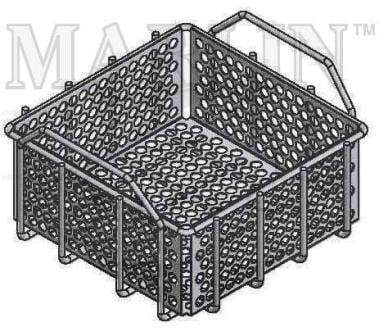 Teflon® is, at this point, a household name. Famous for its non-stick characteristics, this brand-name coating is owned by the Chemours company, which completed its spin-off from DuPont (specifically DuPont’s Performance Chemicals segment) in July of 2015.
Teflon® is, at this point, a household name. Famous for its non-stick characteristics, this brand-name coating is owned by the Chemours company, which completed its spin-off from DuPont (specifically DuPont’s Performance Chemicals segment) in July of 2015.
However, as familiar as most people are with this brand-name coating, many people don’t know very many specific details about Teflon®.
For example, did you know that the Teflon® brand name actually refers to several different kinds of coatings? Many of the coatings under this brand name possess similar properties, but there are differences.
The four types of Teflon® coatings that Marlin Steel uses are:
- PTFE (Polytetrafluoroethylene)
- FEP (Fluorinated Ethylene Propylene Copolymer)
- PFA (Perfluoroalkoxy)
- ETFE (Ethylene Tetrafluoroethylene), AKA Tefzel®
Common characteristics of these coatings include non-stick properties that help prevent materials from sticking to whatever object is being coated. This is a large part of the reason why these coatings have been used for domestic cookware for so long.
Another common characteristic of these coatings is that they are typically applied in very thin layers, only about 0.5 to 5 mils (thousandths of an inch) thick. The porous nature of these coatings also leaves tiny, almost microscopic holes in them, making most of them unsuitable for applications that would completely submerge the basket in liquid.
However, each individual coating has its own properties as well. What are these properties, and what makes them useful for coating parts washing baskets and other custom metal forms?
Characteristics of PTFE Coating
Of the different types of Teflon® coatings, PTFE has the lowest tensile strength, able to withstand roughly 3,000 – 5,000 psi of pressure, according to Lenntech’s assessments of the material.
Even though this makes PTFE the “weakest” of the coatings in this family of products at its minimum value, this is still more than enough to take most common parts washing basket applications. At its maximum tensile strength value, PTFE is second only to Tefzel®.
While PTFE can have the lowest tensile strength, it does have the highest melting point and service temperature. As noted by Lenntech, PTFE Teflon has a melting point of 621 degrees Fahrenheit, and an upper service temperature of 500 degrees Fahrenheit.
This makes the PTFE coating the most desirable for high-temp applications where the coated basket will have to take high temperatures for a prolonged period of time.
Characteristics of FEP Coating
The Lenntech study of Teflon’s® characteristics showed that this material has a tensile strength of 3,400 psi, slightly more than the minimum exhibited by PTFE coatings, but still less than PTFE’s maximum tolerance.
The hardness of the FEP coating material falls on the lower end of this family of coatings. At 56 Shore D on the durometer scale, this makes FEP harder than an average cart’s caster wheel, but less tough than a hard hat.
Of the Teflon® family of coatings, FEP has the second-lowest melting point and maximum operating temperature. FEP melts at 500 degrees Fahrenheit, and should not be used in processes that expose it to more than 400 °F of heat for prolonged periods of time.
Characteristics of PFA
PFA coating is roughly comparable to FEP coating in many ways.
For example, the tensile strength of PFA coating is slightly higher than that of FEP, sitting at 3,600 psi compared, about 200 psi higher than FEP. The hardness of PFA is also just a bit higher than that of FEP, sitting at 60 Shore D on the durometer scale.
The biggest difference is the melting point and operating temperatures of PFA coating. According to Lenntech, the melting point of PFA is 582 °F, and its upper service temperature is 500 °F.
This means that PFA is tied with PTFE for maximum operating temperature, making it almost as desirable for use in high-temperature applications.
Characteristics of ETFE (Tefzel®)
In a few ways, Tefzel® is an outlier among the coatings that Chemours has in the Teflon® brand.
First, this coating, unlike other Teflon® coatings, is sometimes useful for parts washing applications that involve complete immersion in liquid.
Second, ETFE has the highest tensile strength of any coating in this product family. At the low end, this material can take 5,800 psi of pressure. On the high end, it can take 6,700 psi of pressure.
To complement its high tensile strength, ETFE has the highest hardness of the four Teflon® coatings used by Marlin. The hardness rating of ETFE ranges from 63 to 72 Shore D on the durometer scale.
However, even though this material has the highest hardness and tensile strength, it has the lowest melting point and operational temperature of the Teflon® coatings. At about 437 °F, ETFE will begin to melt. For continuous use, it’s generally best that the operating temperature of this material doesn’t exceed 311°F.
Choosing a Coating
When picking a coating for a custom parts washing basket, or any other application, Marlin’s degreed engineers take a careful look at the mechanical properties of the coating, the material of the basket itself, and the nature of the parts finishing/washing process that the basket will be used in.
For many high-temp applications where keeping parts or fluids from sticking to the basket is an issue, PTFE and PFA coatings are often desirable. On the other hand, processes that involve submerging the parts either partially or wholly in liquid substances might benefit more from an ETFE coating.
With the right coating and basket material, it’s possible to streamline your parts finishing process and improve productivity.
Related Articles:
Should I Use Teflon® Coating for My Ultrasonic Cleaning Container?
Stainless Steel Parts Washing Baskets Vs Teflon®-Coated Baskets



.gif)


